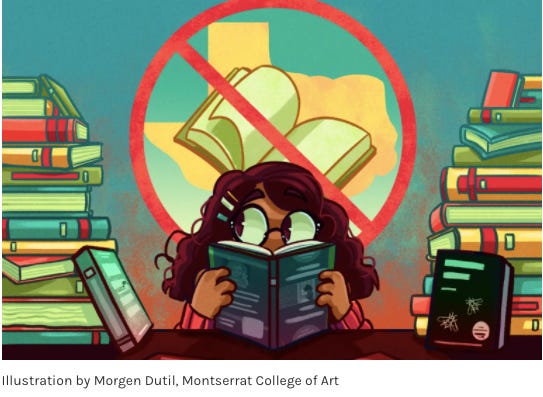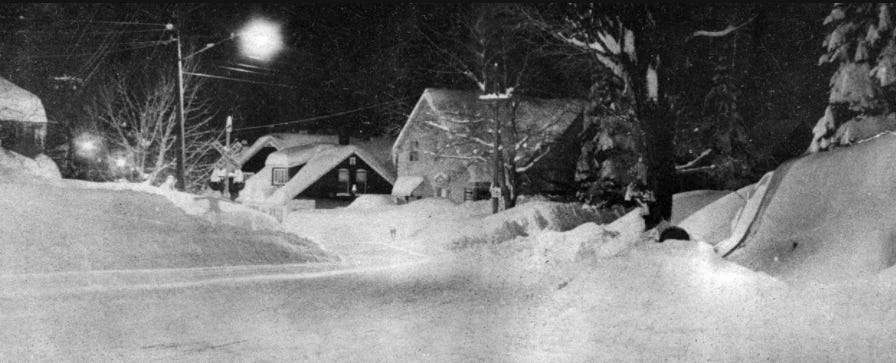What was your forbidden fruit?
Think back. You’re thirteen again, or twelve or any age when the adults in your life consider you “too young” for certain reading material, movies, music, or art.
Did that make you want it more?
If you got your hands on a book, a story, a comic, or went to a movie that was not “age-appropriate” how did it impact you?
And you’ve got a story about what it took to sneak that art into your life, let’s hear it. Click the button below and spill:
What’s going on here?
This week, I’m going to shut up (mostly) and invite you to fill in the blanks. I’ll be doing this once a month - introducing a question or a prompt and seeing where it takes us.
Our inaugural question is inspired by the resurgence of controversy in school districts around the country over what books children should be able to ingest. Not surprisingly, sales of books like Maus and Beloved shot up after some school districts removed them or tried to remove them from their libraries and curricula. There’s no mystery here; the lure of forbidden fruit is older than the story of Eve and that luscious, ripe apple.
It was also prompted by this quote I came across when I decided to find a copy of Kurt Vonnegut’s classic Slaughterhouse Five:
“If you were to bother to read my books, to behave as educated persons would, you would learn that they are not sexy, and do not argue in favor of wildness of any kind. They beg that people be kinder and more responsible than they often are. It is true that some of the characters speak coarsely. That is because people speak coarsely in real life. Especially soldiers and hardworking men speak coarsely, and even our most sheltered children know that. And we all know, too, that those words really don’t damage children much. They didn’t damage us when we were young. It was evil deeds and lying that hurt us.”- Kurt Vonnegut, letter to Charles McCarthy 16th November 1973
I first read this book when it came out in 1969. That winter our house and all those of everyone we knew were buried in the most massive snowfall recorded in centuries. School was canceled for days at a time. My parents may have overlooked a lot of things we kids did then as long as we kept ourselves occupied. Besides, they were pretty open - whenever they caught me with one of their books, they’d be more likely to frown and say, “At least wait until I’ve finished” or “Don’t tell your grandmother”-- this last in response to some unpleasantness she caused when I informed her I’d read Portnoy’s Complaint.
Did I understand everything I read that winter? Not really. The words were easy enough but the stories themselves left me with lots of questions about war, love, sex, and in the case of Philip Roth’s Portnoy’s Complaint, the significance of that piece of liver. But reading them didn’t hurt me. Far from it. The parts that were mysteries seemed to dangle just out of my reach like a basket of juicy, tantalizing apples. The only way to make them mine was to keep reading and asking questions until I understood.
Enough about me. What about you?
That’s it for this week. I’ll be checking regularly to see what you’ve written and to chat back in the comments section. I’m looking forward to this! In the meantime, you can find any of the books mentioned here over at the Spark Community Recommendations Page at bookshop.org where every sale helps local bookstores. Our commissions, should we generate enough, will go to support literacy programs chosen by this community.
Ciao for now.
Gratefully,
Betsy
P.S. Here’s your moment of Zen…When the snow kept coming, and coming…
While I was reading Kurt Vonnegut inside, this is what it looked like outside. A snapshot from the “100-hour” storm that came in the middle of one of the longest winters in northern New Hampshire.
Calling for Your Contribution to “Moment of Zen”
What is YOUR moment of Zen? Send me your photos, a video, a drawing, a song, a poem, or anything with a visual that moved you, thrilled you, calmed you. Or just cracked you up. This feature is wide open for your own personal interpretation.
Come on, go through your photos, your memories or just keep your eyes and ears to the ground and then share. Send your photos/links, etc. to me by replying to this email or simply by sending to: elizabethmarro@substack.com. The main guidelines are probably already obvious: don’t hurt anyone -- don’t send anything that violates the privacy of someone you love or even someone you hate, don’t send anything divisive, or aimed at disparaging others. Our Zen moments are to help us connect, to bond, to learn, to wonder, to share -- to escape the world for a little bit and return refreshed.
I can’t wait to see what you send!






What you don’t know about can’t be forbidden, so D H Lawrence’s Lady Chatterley’s Lover passed me by until I was into adulthood. When I did finally read it, I wondered what all the fuss was about? Not his best novel by any measure. The first ‘adult novel’ came my way at 14 and I still have, the old battered copy of God’s Little Acre by Erskinr Caldwell that I was given in 1958. I re-read it during lockdown, as gritty, sexy and sensuous as ever, still on the side of the working class. No wonder I loved it then and still love it now. I guess the man may have pissed of the American right back then. Robert Howard. A PS. 3 hours ago I was having a cataract removed and here I am reading and typing on my iPad. Amazing!
My parents had built in bookshelves and a fireplace in their bedroom. It was nice, but austere. It was only for them, not a family reading area. On the bookshelves were many books I used to look at, but the ones that struck me in that time, 1969, (I was 9)were the books about WW2 my dad kept. He never talked about the war, so seeing the books he purchased opened my eyes a bit to what he experienced. It felt like I was snooping. I know that sounds odd, but I remember that well. No books were really off limits though. I practically lived for going to the library.